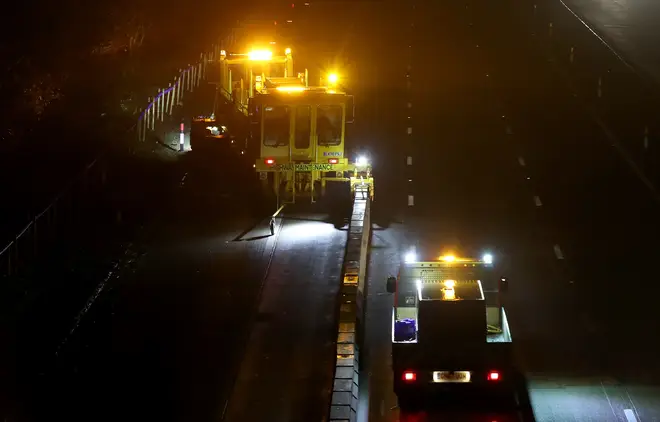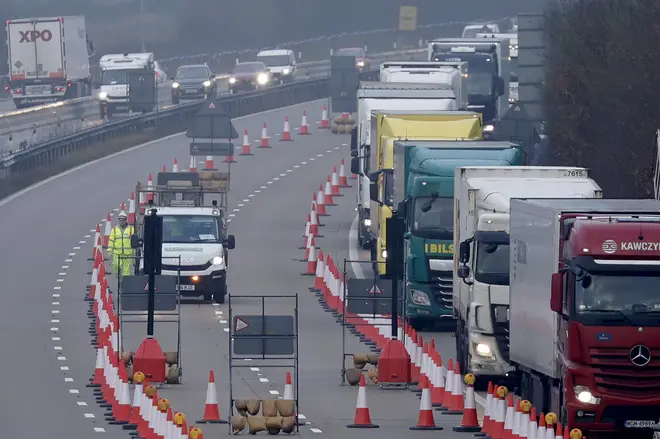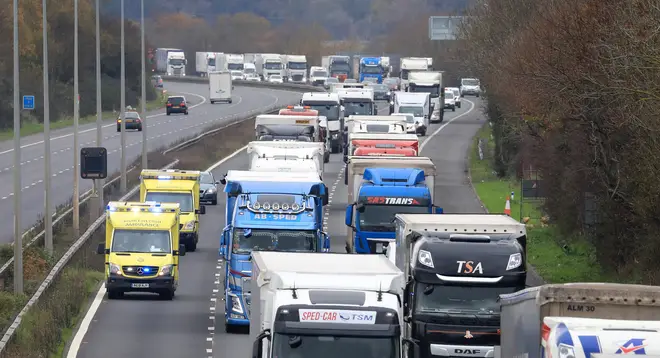
Paul Brand 10am - 12pm
12 December 2020, 12:32 | Updated: 12 December 2020, 12:59

A section of the M20 motorway will close overnight for several days as part of a “dress rehearsal” for traffic problems after the UK leaves the EU.
Operation Brock includes placing a moveable concrete barrier to create a new motorway layout, aimed at easing congestion on the M20 in Kent.
Friday was the first night of the plan practice run, which will last for four days and see the creation of a contraflow system and diversions.
The “state-of-the art” barrier is intended to be used in case there are queues of freight heading towards Dover, with up to 7,000 trucks forced to park up on the motorway for up to two days each.
It is much quicker to deploy than previous systems which took weeks to install and remove, and allows more traffic to continue using the motorway, off local roads.
Read more: Royal Navy ships to patrol UK fishing waters as Brexit talks enter final hours
Highways England south east operations director Nicola Bell said the “test will provide a valuable dress rehearsal into the operation of our Kent-wide port disruption contingency measures”.
At the end of the test on Monday night, the barrier will be returned to the hard shoulder, ahead of any use after 31 December.
Read more: Supermarkets and shoppers face major price hikes from tariffs if Brexit talks fail
Read more: PM will fail on election promise if there is no-deal Brexit, Starmer says

Mark Rolfe, the head of the Kent Resilience Forum, told LBC: “The plan that we have got in the whole of Kent and Medway is designed to keep all of the freight traffic that is going to the border with the EU flowing.
He added that the intention is to keep “any HGVs heading for the ports on the major strategic road network... with the idea that the communities of Kent won’t face any more disruption than is absolutely necessary”.
Read more: BA staff to strike over Christmas and New Year risking cargo chaos
Transport Secretary Grant Shapps said: “Kent is a critical link to one of our busiest trade routes, and this state-of-the-art technology will ensure that we can keep the local road network moving.
“Testing this barrier now will ensure that if the system is needed it can be quickly and safely deployed, helping drivers get to where they need to be - even in the event of disruption at the end of the transition period and to assist with any other future disruption caused for any reason.”
Brexit border control tests carried out for just one day at the Channel Tunnel at the end of November gave a taste of the gridlock that Kent could see after the end of the transition period.
Slowed traffic covered over five miles of the Kent motorway and Highways England was forced to close the entry and exit sliproads at Junction 11 due to the number of HGVs parked on the hard shoulder.
Read more: Congestion at UK ports 'out of control' ahead of Brexit

Ahead of concerns over disruption hitting Kent, the local county council have also announced they have been given new powers to clamp HGVs and fine drivers if lorries are parked illegally.
KCC Leader Roger Gough said: “We recognise that antisocial HGV parking is already a problem in Kent and something that will most likely become worse once we have left the EU.
“I’m grateful to the government for giving us these temporary powers which will act as a deterrent to any HGV driver and ensure that compliance is greater, meaning key routes on Kent’s road network are kept clear.
“Though we have worked hard on traffic management plans in conjunction with our partners, we cannot guarantee there will not be a certain amount of freight turned back from the Port of Dover, Eurotunnel or from the Manston or Sevington sites if paperwork is not in order.”
Explained: What could a no-deal Brexit mean for you?

Cargo director warns congestion will get worse at ports with Brexit
The ports in the UK are already feeling the pressure. On Thursday, a cargo director at Portsmouth told LBC congestion at UK ports is "not under control".
Steve Williams, an operations director at Portico Shipping in Portsmouth, said the backlog of goods currently seen at UK ports "is just the beginning".
Read more: Congestion at UK ports 'out of control' ahead of Brexit
He also warned that congestion will get worse in the build-up to, and weeks after, the transition period expiring at the end of the month which could affect delivering Christmas orders on time.
"Brexit has had an impact," Mr Willaims said.
"People are trying to get goods into the UK, trying to avoid paying extra tariffs or customs clearance in the new year."
He added: "It's causing a bigger backlog in the major ports so they're stuck with either empty containers or full containers with nowhere to go.
"This is just the beginning. People are saying it's under control. It isn't under control."